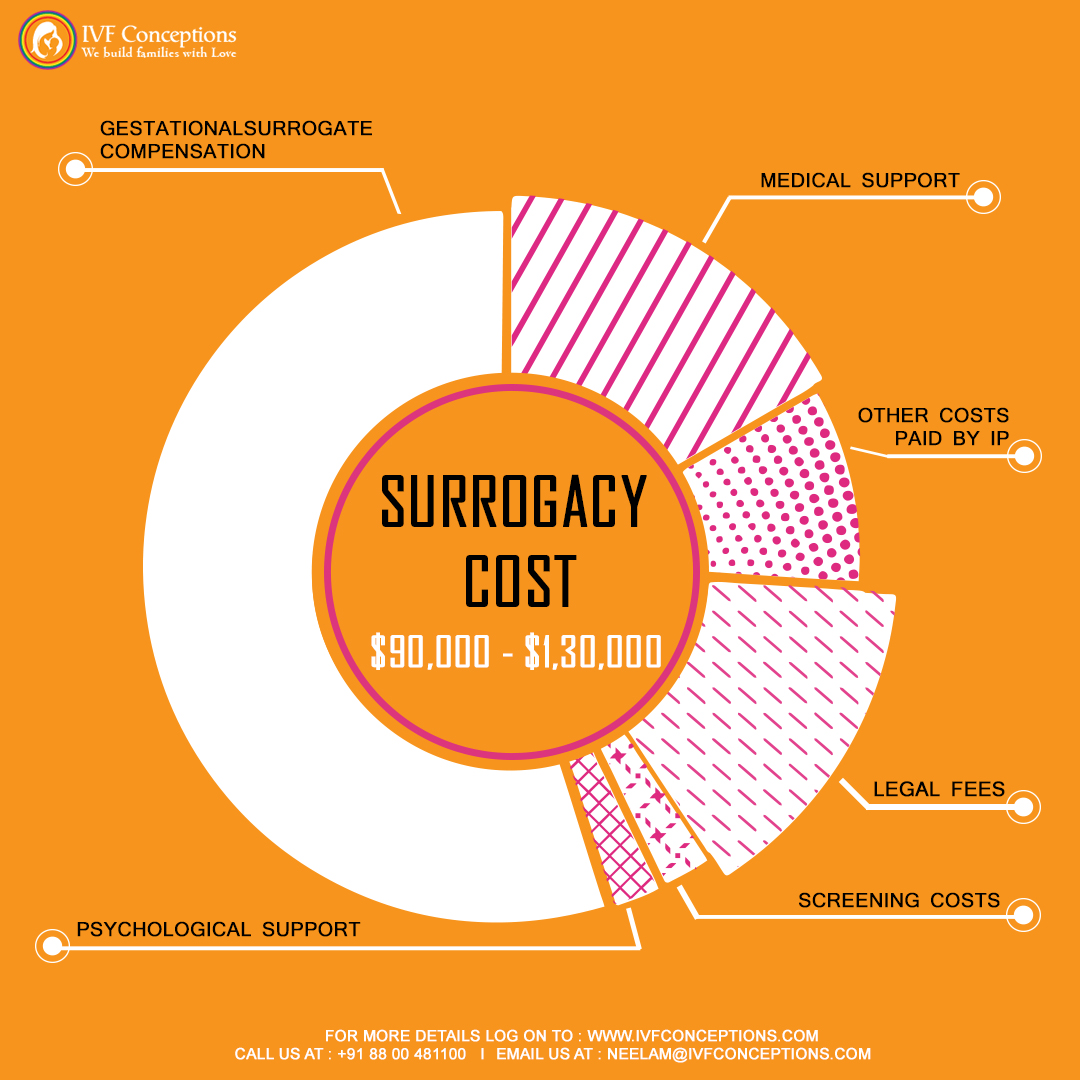Average Cost of a Surrogate: What to Expect
Starting a surrogacy journey can change your life, but it’s also a big financial step. Ever thought, “How much does a surrogate cost?” The cost varies a lot, depending on many things. It’s important for parents-to-be to know these costs when planning their journey.
When considering surrogacy, understanding the surrogacy price and associated surrogate mother cost is crucial. The surrogate mother fee can vary significantly depending on several factors, leading to different surrogate prices and surrogate pricing structures. On average, the cost for a surrogate ranges widely.
- Book an online appointment: Get a free online consultation.
- Call\W:+91-8800481100 Email:neelam@ivfconceptions.com
Key Takeaways
- The average total cost of a surrogacy journey in the United States can range from $125,000 to $175,000, with some cases exceeding $250,000.
- Surrogate compensation typically ranges from $30,000 to $60,000, depending on the surrogate’s experience and location.
- Agency fees can range from $15,000 to $30,000, covering various services and support for intended parents and surrogates.
- Legal fees for surrogacy agreements typically range from $5,000 to $15,000, varying by state and complexity of the contract.
- Medical costs, including IVF, embryo creation, and insurance for the surrogate, can add an additional $40,000 to $80,000 to the total cost.
Additional resources to Read:
Important Questions to Ask a Surrogacy Agency
Disqualifications for Surrogacy – What You Need to Know
Is Surrogacy Covered by Insurance? Your Guide to Coverage
How Much Does a Surrogate Cost – Key Details Explained
Understanding the World of Surrogacy
Surrogacy is a big step for people and LGBTQ+ families to start their families. Gestational surrogacy is the most common type, where the surrogate isn’t related to the child by blood. Traditional surrogacy means the surrogate uses her own egg, which is then fertilized with sperm from the father or a donor.
Definition and Overview of Surrogacy
Surrogacy is a detailed process. A woman, the surrogate, carries a pregnancy for another couple, the intended parents. She agrees to give up all rights to the child after birth. This lets parents who can’t carry a pregnancy themselves have a child related to them.
Reasons for Choosing Surrogacy
People choose surrogacy for many reasons, including:
- Infertility: It’s an option for those who can’t carry a pregnancy because of health issues.
- Health complications: It helps people with health problems or past pregnancy troubles to have a child.
- Same-sex relationships: It lets LGBTQ+ couples, including men, have a child linked to one of them.
- Being a single parent: It’s a way for single people to become parents.
It’s important for those thinking about surrogacy to understand the process, its emotional and financial sides.
Surrogacy Cost Breakdown

When thinking about surrogacy, it’s key to know the different costs involved. The total cost of surrogacy includes several main parts. Each part is important for the overall cost.
Surrogacy Cost Breakdown
| Cost Component | Description | Estimated Cost |
|---|---|---|
| Agency Fees | Covers services such as matching parents with a surrogate, thorough screening, and managing the process. | $15,000 – $30,000 |
| Surrogate Compensation and Expenses | Includes base pay for the surrogate and additional expenses like medical tests, pregnancy costs, and lost wages. | $75,000 – $110,000 |
| Legal Fees | Covers the creation of legal contracts, protection of parental rights, and other legal aspects of surrogacy. | $5,000 – $15,000 |
| Medical Costs | Includes costs for IVF, embryo creation, and egg donation. | $20,000 – $30,000 |
| Total Estimated Cost | The overall cost, depending on individual circumstances and additional costs. | $95,000 – $180,000+ |
| Financial Assistance Options | Options such as loans, grants, insurance, and fundraising to help manage surrogacy costs. | Varies |
-
Agency Fees
Agency fees for surrogacy can be between $15,000 and $30,000. These fees cover important services like matching parents with a good surrogate, doing thorough checks, and managing the surrogacy process.
-
Surrogate Compensation and Expenses
Pay for the surrogate and their expenses are big parts of the cost. The base pay for the surrogate is usually between $45,000 and $50,000. Parents-to-be might also pay for medical tests, pregnancy costs, and the surrogate’s lost wages. This can add another $30,000 to $60,000 to the total cost.
-
Legal Fees
Legal fees for surrogacy can be from $5,000 to $15,000. These fees cover making legal contracts, protecting parental rights, and dealing with the legal side of surrogacy.
-
Medical Costs
Medical costs for surrogacy are big, including IVF, embryo creation, and egg donation. These costs can be from $20,000 to $30,000.
The total cost of surrogacy can start at about $95,000, not counting medical costs. It can go up to $180,000 or more, depending on the situation and extra costs.
Options like loans, grants, insurance, and fundraising can help parents manage the cost of surrogacy.
What is average cost of a surrogate
In the United States, the cost of surrogacy can be between $100,000 to $140,000. But, the price can change a lot because of different factors. It’s important for parents-to-be to know what affects the cost as they plan their surrogacy journey.

Factors Affecting the Cost
Many things can change the cost of surrogacy, including:
- Location: Costs can vary by state, with places like California often being more expensive.
- Surrogate Compensation: More experienced surrogates might ask for more money, from $35,000 to $60,000. Total costs can go up to $65,000 to $95,000.
- Agency Services: The services from the surrogacy agency can also affect the price. Basic services start at $35,000 to $55,000.
- Medical Expenses: Things like IVF, prenatal care, and unexpected medical issues can add $25,000 to $45,000 to the total cost.
- Legal Fees: Legal help for surrogacy can cost between $10,000 to $25,000.
Location and Agency Impact
Where you have the surrogacy can change the cost a lot. For instance, it might cost about $144,000 in New York but $87,000 to $130,000 in Texas. The surrogacy agency’s services, from just matching to full support, also affect the price.
Knowing these factors helps parents plan their budget better. They can look into financing options or check if their employer offers fertility benefits to make surrogacy more affordable.
Insurance Coverage for Surrogacy
Surrogacy can be expensive, and many intended parents face a big financial challenge. Most health insurance plans don’t cover surrogacy costs. But, there are ways to help with the expenses.
Some insurance plans might cover the surrogate’s pregnancy costs, like prenatal care and delivery. This depends on the plan and the laws in your state. Intended parents might need to buy extra insurance for their surrogate or pay for her insurance.
Recently, some employers have started offering fertility benefits, including surrogacy coverage. This can be a big help for parents wanting to reduce the cost of surrogacy.
For those without employer benefits, there are surrogacy insurance plans. These plans cost between $15,000 to $24,000 for the whole surrogacy process and recovery. They offer specific coverage for surrogacy procedures.
Insurance for surrogacy varies a lot by provider and state. Some policies won’t cover surrogate pregnancies, while others might cover parts of fertility treatments like IVF.
It’s smart for intended parents to talk to an insurance expert. They can give personalized advice on surrogacy coverage.
“Unfortunately, roughly 90% of insurance policies for surrogates do not cover a surrogate pregnancy.”
| Insurance Provider | Surrogacy Coverage |
| Tricare | Does not cover surrogate pregnancies |
| Blue Cross Blue Shield | May cover the surrogate’s maternity expenses |
| Aetna | May partially cover IVF costs and surrogate maternity costs |
| Cigna | Does not have exclusion clauses for surrogate pregnancies |
It’s important for intended parents to understand surrogacy insurance well. By looking into their options and getting expert advice, they can find the best ways to make surrogacy more affordable.
Financial Planning and Assistance
Starting a surrogacy journey means you need to plan your finances carefully. You should make a budget that includes all possible costs, like agency fees and medical costs. Planning and saving for surrogacy early helps you handle this big expense better.

Budgeting and Saving Strategies
First, find out the average cost of a surrogate in your area. Things like agency services and where you live can change the price. With this info, make a budget that covers everything you expect to pay:
- Agency fees (usually $20,000 to $40,000)
- Surrogate compensation ($30,000 to $75,000)
- Egg donor fees ($16,000 to $20,000)
- Legal fees ($15,000 to $20,000)
- Medical and insurance expenses ($15,000 to $30,000)
- IVF and medication costs ($8,000 to $30,000)
- Additional charges (like travel, maternity clothes, childcare) ($10,000 to $15,000)
To save for surrogacy, think about opening a special savings account. Look into employer benefits or surrogacy grants and financial assistance programs too.
Financing Options and Grants
If surrogacy costs look too high, there are ways to finance it. You might consider personal loans, medical loans, or home equity loans. Also, look into surrogacy grants and financial assistance programs for help.
By planning your surrogacy financial planning well and checking out different financing options and grants, you can make surrogacy easier. This way, you increase your chances of success.
Additional Resources to Read:
Cost of Surrogacy in the UK – Comprehensive Guide
Low-Cost Surrogacy Options for Intended Parents – Explore Now!
Cost of Surrogacy in California – Comprehensive Guide
Surrogacy for LGBT Parents: A Path to Parenthood
Conclusion
Surrogacy in the United States can cost more than $100,000. Yet, for many, it’s a priceless journey to becoming parents. Understanding the costs, insurance, and financial help can make the process easier.
The emotional joy of having a family through surrogacy is unmatched. Despite the costs, it’s a rewarding experience. As surrogacy changes, staying updated and working with experts is key to a successful journey.
There’s a lot of research on surrogacy, showing its growing importance. The costs might seem high, but for many, it’s worth it to build a family this way. It’s a life-changing experience that many are eager to take on.
If you’d like to learn more about IVF, Egg Donation, or surrogacy services globally, check out the rest of our website at Georgia Surrogacy Agency. We offer legally secure and affordable surrogacy consulting services for FREE.
Get in touch for FREE SURROGACY CONSULTING:
Mobile: +91-8800481100 ( WhatsApp, Line, Viber)
Email: neelam@ivfconceptions.com

FAQs for Average Cost of a Surrogate
What is the average cost of surrogacy in the United States?
Surrogacy in the U.S. can cost between $100,000 to $140,000. Sometimes, it can reach up to $250,000 or more. This depends on several factors.
What are the main components of the surrogacy cost breakdown?
Surrogacy costs include fees for agencies, compensation for the surrogate, legal fees, and medical expenses. These include IVF and embryo creation.
What factors can affect the overall cost of surrogacy?
The cost of surrogacy can change based on several things. These are the location, the agency’s services, the surrogate’s experience, IVF cycles needed, and unexpected medical issues.
Does health insurance cover surrogacy-related expenses?
Most health insurance plans don’t cover surrogacy costs. But, some might pay for prenatal care and delivery. This depends on the plan and state laws.
What strategies can intended parents use to manage the financial burden of surrogacy?
To handle surrogacy costs, parents can save early, look into loans, and check out grants and financial help programs. These steps can ease the financial load of surrogacy.
Source Links
- https://www.today.com/parents/parents/surrogacy-costs-rcna40050 – How much does surrogacy cost?
- https://www.investopedia.com/how-much-does-a-surrogate-cost-6752258 – How Much Does a Surrogate Cost?
- https://familyequality.org/resources/the-costs-of-surrogacy-what-you-need-to-know/ – Family Equality | The Costs of Surrogacy: What You Need to Know – Family Equality
- https://fertilitycenterlv.com/fertility-treatments/price-us-surrogacy/ – Price of US Surrogacy
- https://www.southernsurrogacy.com/intended-parents/program-fee/ – Costs of Surrogacy | Breakdown of Southern Surrogacy’s Program Fees
- https://www.gostork.com/surrogacy/how-much-surrogacy-cost/ – How Much Does Surrogacy Cost? A Breakdown for Intended Parents
- https://www.westcoastsurrogacy.com/surrogate-program-for-intended-parents/surrogate-mother-cost – Surrogate Mother Costs & Pricing | How Much Does Surrogacy Cost?

Highly esteemed, authoritative, and trusted professional with a 14-year of experience in international surrogacy. Advocate for Secure, Legal, and Affordable International Surrogacy.
Neelam Chhagani, MA (Counselling Psychology) and Holistic Infertility and Third-Party Reproduction Consultant.
Member of European Fertility Society, Best Surrogacy Blogger of 2020, with 300 dedicated blogs, and top contributor on Quora for Surrogacy.


Add Your Comment